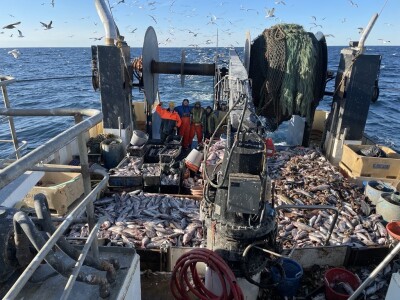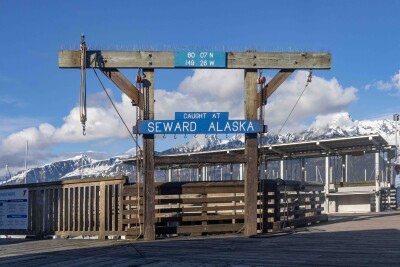Forgive me for being an optimist when the subject is New England cod – specifically, cod management. But it’s difficult to avoid drawing comparisons between cod research Kevin Stokesbury of the University of Massachusetts at Dartmouth is now in the midst of and scallop research he led two decades years ago.
Stokesbury and his team from the School of Marine Science and Technology are conducting a video survey of cod on Stellwagen Bank, off Massachusetts.
Results? So far, so good. “The seven-day cruise was very successful,” Stokesbury said yesterday in a news release. “Atlantic cod were observed over much of the bank, and the largest closed tow collection was of 345 cod in a half hour, with individuals measuring up to [32.7 inches]. The idea is to increase the amount of sea floor sampled per sea day without killing more fish.”
They do this by means of a commercial trawl with an open end, through which the flow of fish is monitored by a video camera. Periodically the end is closed to allow the researchers to take samples, which are kept alive in wells and released.
I should note, for those of you who fish on pelagic trawlers, menhaden steamers, and factory ships that while 345 fish in 30 minutes may not sound like much, it is a cornucopia today amid the never-ending dirges offered by the cod’s various well-funded saviors.
In the 1990s, the federales became convinced that scallops were overfished and reduced harvests, and in 1997 they threatened to lower the boom on the fishery for once and for all.
Enter Stokesbury and a team from UMass Dartmouth. Financed by the industry, the researchers used video cameras to prove not only that scallops were not declining, but that they were in fact abundant. Their work paved the way for the rotational management system that now guides the scallop fishery in the United States, the most valuable in the United States.
Naysayers will point out that a lot of cod on Stellwagen doesn’t mean that cod will be ass-deep anywhere you turn. But as Stokesbury and his team expand their survey they will if nothing else “reduce the uncertainty” – Stokesbury’s words – surrounding stock estimates, a critically important mission in a fishery managed by the precautionary principle.
Score another one for industry research.







